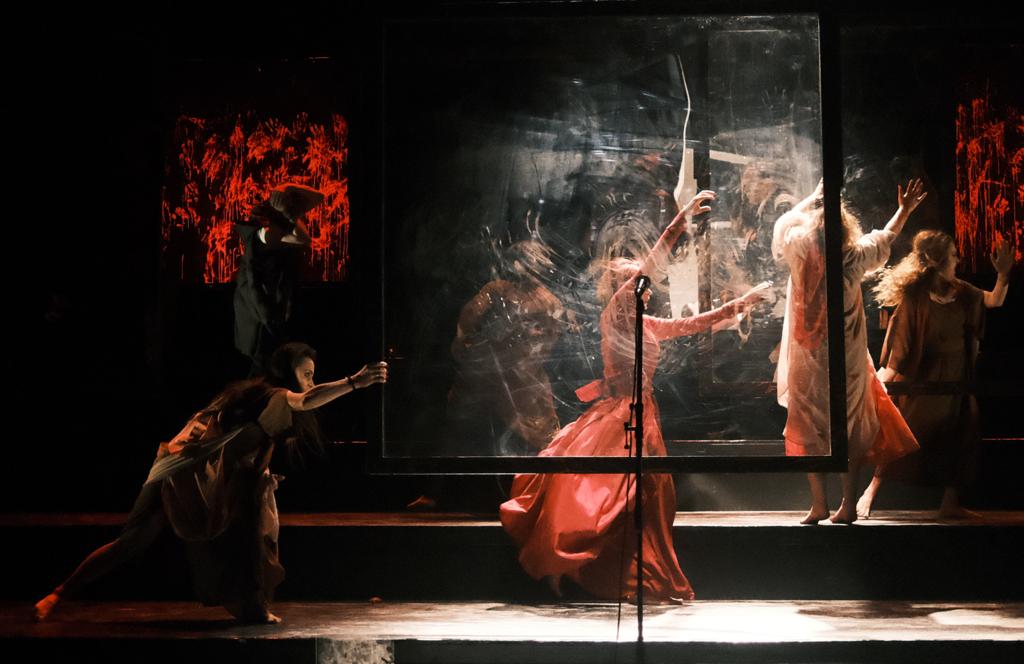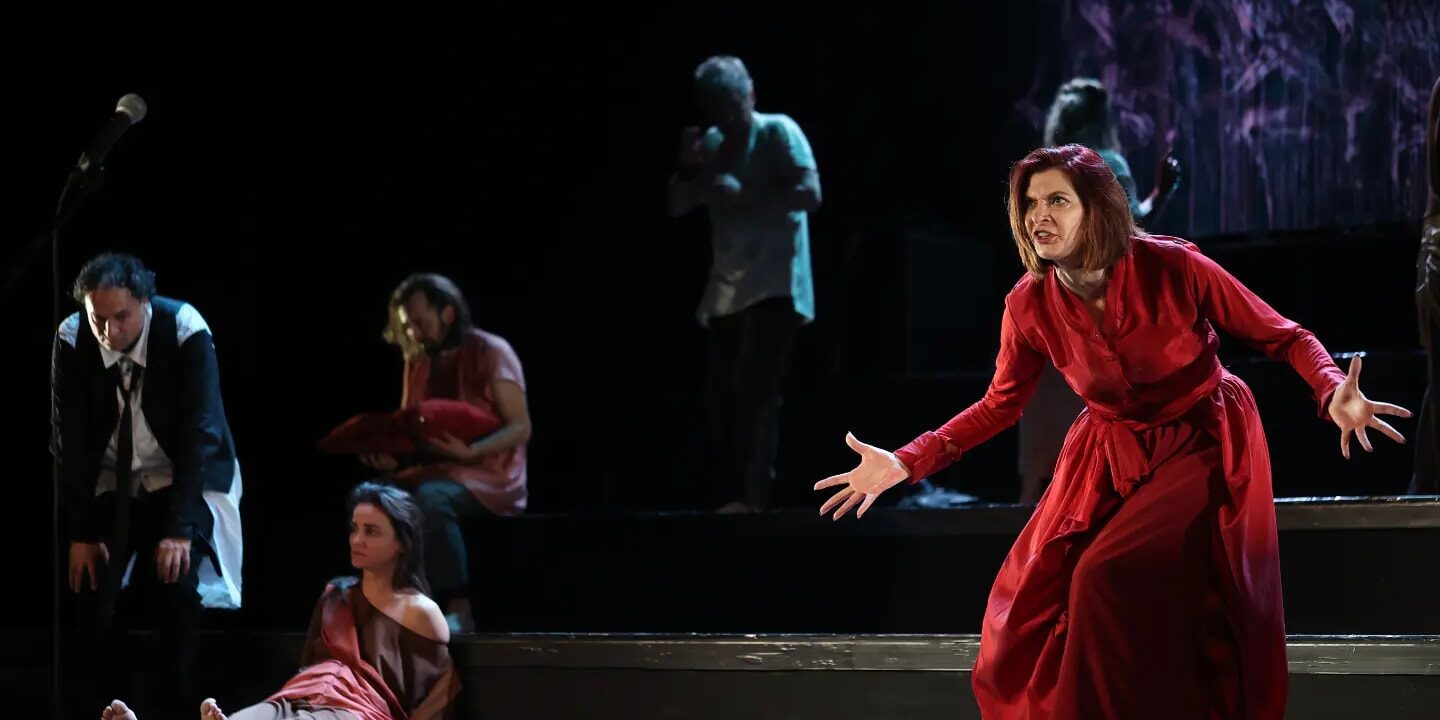Arturbina, National Theater of Albania, premiere 30th March 2023
Written in 1957, Tennessee Williams’ take on the Orpheus myth exposed the underbelly of American society of the time—corruption, racism, narrow-mindedness. The clash between Orpheus and this society was coupled with the idea that love and creativity can redeem and regenerate, one of Williams’ fundamental notions.
The play is set a dry goods store in a small southern town in the United States. Val is a musician, just like the god of vitality, Orpheus, who he symbolizes. Lady, a middle-aged woman who owns the dry goods store, hires Val to work for her. She is unhappily married to an older man Jabe, who is dying. Val’s arrival at Lady’s shop revitalizes her and she falls in love with him. The play charts the growing passion between them until the inevitable tragic ending.
In Nastazja Domaradzka’s production, the actors are on stage before the performance begins; they are there waiting for us – perhaps rehearsing – as we enter. Designer Ledia Hajdari’s set consists of a five-step staircase on which the actors move in an often-disorderly manner. Above the stairs are six large glass panels that are moved by the performers and help generate the show’s dynamics.
The set-up hardly changes throughout the show. The actors remain constantly on stage, but this gives the performance a sense of timelessness and permanence. And though static in some senses, a dynamic is created by the story, the movement and the manipulation of the glass panels by the actors.
Lighting designer Lucia Sanches Roldan saturates the stage with red. This, combined with Lady’s red dress and Rona Castrioti’s music, helps to create a suitably hellish atmosphere. The lighting also contributes to the concept of community on stage; in hell, no one is special.
Thanks to all these elements, the show is very atmospheric, but it falters in the way the narrative is presented. After the show, some of my friends struggled to explain the plot, however many of them still liked the show in spite of this. It did not impact on their enjoyment.
Perhaps one of the reasons for their confusion is the way in which Val’s character has been divided into three and played by three different actors: Igli Zarka, Genti Decka and Lulzim Zeqja. These actors do not resemble each other either physically or in the manner of their performance, which has the effect of diminishing the significance of Val as a character. The downward trajectory between the three Vals also eventually starts to feel unnecessary and redundant. While it would have been intriguing to see how Val changes as a result of this toxic environment, the way in which the other characters start to despise him comes to feel illogical.
The main focus of the play is clearly Lady. Played by Ema Andrea, she is the key. It is Lady who explains to us why this place is hell and Domaradzka has given Lady’s storyline the most weight within the show. The two town gossips, Dolly and Beulah, played by Era Caushi and Flaura Kureta, talk about her all the time, about the bar she is trying to open, about her past relationships and her current love for Val. Her husband Jabe (played by Neritan Licaj) is the Hades in this hell in which Lady is alone and will stay like that, a choice that comes to look like an act of resistance against her surroundings. Andrea’s interpretation lends the character dramatic weight, something she maintains throughout.

Orpheus Descending, National Theatre of Albania
Val is initially brought to Lady’s shop by Vee Talbott, a painter and the wife of Sheriff Talbott, played by Besmir Bitraku. The sheriff is both the representative of the law and the right hand of Jabe, Both characters are relatively one-dimensional but serve a function, as figures of power, in contrast to Vee Talbott’s character, who remains opaque, her role in the show unclear.
In both the original and the adaptation, the characters are closely clustered together. They seem to function as a single, integrated entity. Amid this group of characters, Carol Cutrere, played by Olta Daku, is excluded from the town; her family pays her not to live near them, which seems a little grotesque, but the character, as played by Daku. justifies this. She is messy and chaotic and wants to draw Val into her world. Her character resembles the bandage on a wound that becomes tainted after soaking up all the poison. As a result, Carol is rejected. She is rejected because she embodies all the darkness in the town. Val, on the other hand, stands in contrast to the ugliness of the town with his purity.
Carol’s brother – and Lady’s ex-lover – David, played by Dritan Boriçi, represents the prevailing spirit of the town. He whispers to some characters, and makes statements on a microphone, speaking the author’s words. The use of this character in this way is one of the show’s strongest points, and Boriçi’s performance is suitably multidimensional.
Borici’s character is one of the best aspects of this adaptation. Williams’ play has also been adapted to reflect some aspects of Albanian reality. For instance, the revenge taken against Lady’s father does not arise because he sold alcohol to people of colour, rather because he sold it to politically persecuted people during the dictatorship. These changes are interesting but feel unfinished and incomplete; it might have benefited from the inclusion of a dramaturg in this process, but then the National Theater would need to employ one.
Despite the fact that the show leaves you with some unclear ideas and does not always completely convince (not helped by the fact that you can’t often hear what the actors are saying, the scandalous acoustics of Arturbina remain a big problem for every show that is staged there – and for this show it felt even more problematic), it succeeds in terms of atmosphere, successfully creating the feeling of being trapped in a place where there is no hope, where nothing grows, and every effort seems to go wrong.
Credits:
Director: Nastazja Domaradzka//Translator: Artur Lena//Scenography and Costumography: Ledia Hajdari//Composer: Rona Castrioti// Lighting designer: Lucia Sanches Roldan
Cast: Dritan Borici, Flaura Kureta, Era Çaushi, Adelina Muça, Igli Zarka, Olta Daku, Ema Andrea, Neritan Liçaj, Genti Deçka, Besmir Bitraku, Lulzim Zeqja
Further reading: Orpheus Descending in Albania: “Art is there to shake people up”
Further reading: interview with Besmir Bitraku: “Directing has made me a better actor”
Further reading: interview with Ema Andrea: “Freedom is not something that is given to you, it is something you fight for”
Flamur Dardeshi is a freelance writer based in Tirana. He has contributed in the areas of translation, analysis, and poetry. His main fields of interest are literature, cinematography, and theatre.








